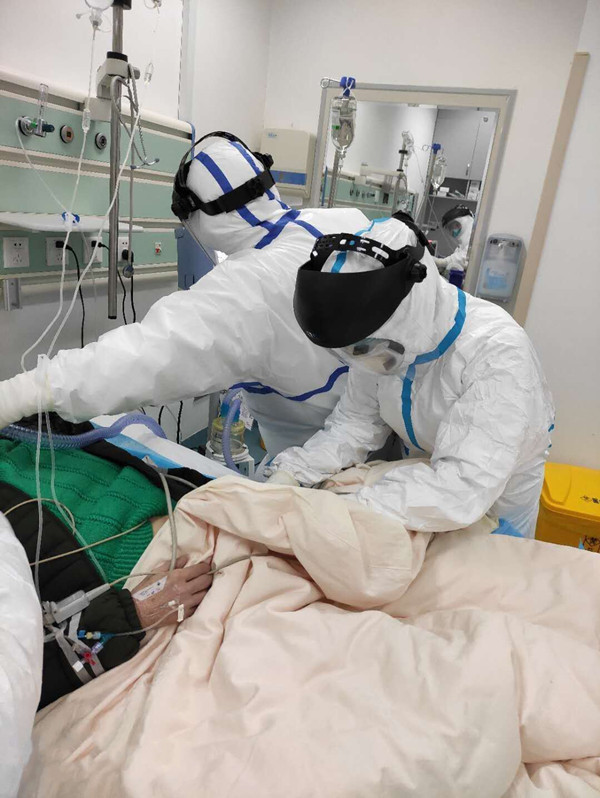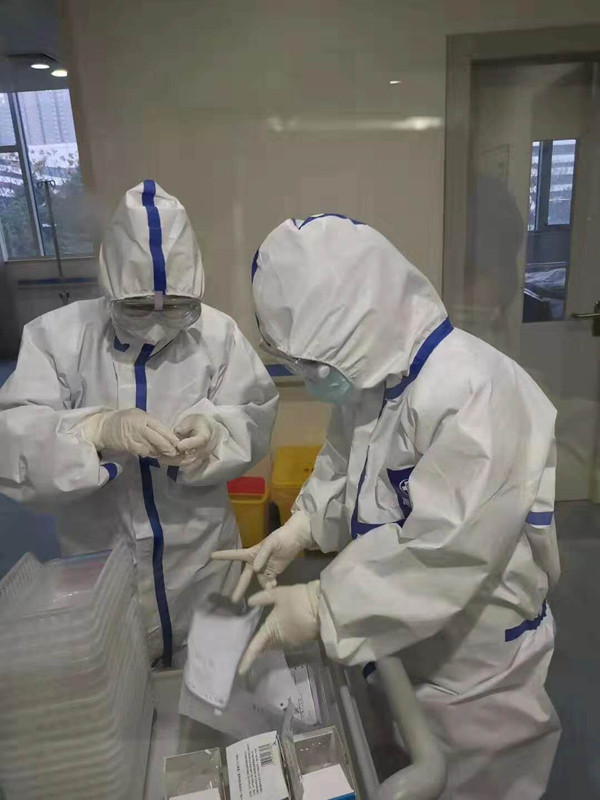Coronavirus outbreak: A doctor on the frontline in Wuhan
- By Zhang Lulu
 0 Comment(s)
0 Comment(s) Print
Print E-mail China.org.cn, February 18, 2020
E-mail China.org.cn, February 18, 2020
Dr. Jiang headed back home for the first time in two weeks, carrying his laundries to wash and bags of fresh meat and vegetables he bought on the way. He stopped in front of his home, put everything down, and left after exchanging words with his parents inside. They did not open the door.

"Of course I wanted to go inside to be with them for a while," he said. "But what if I got them infected?"
The doctor had every reason to be extra careful. He works in the emergency room of a hospital in central China's Wuhan, the epicenter of the ongoing novel coronavirus outbreak. In late January, his hospital was designated for treating patients in severe conditions. He began staying in the hospital apartments rather than going home, where he lives with his elderly parents.
Even among the countless doctors in Wuhan and across China racing against time to contain the outbreak, Jiang could be one of the most at risk. As of Feb. 11, 1,716 medical workers around the country had been confirmed with the novel coronavirus infections, including six reported deaths.
Frontlines from the beginning
Jiang was assigned to the hospital's fever clinic—the very forefront of the fight against the virus. His work focuses on screening suspected cases, such as people who have shown symptoms or had close contact with infected patients.
The screening is the first step for deciding the treatment of hospital visitors. Earlier during the outbreak, doctors had to decide whether a patient required hospitalization or could be self-quarantined at home. Jiang recalled having to see as many as 35 patients in a four-hour shift, and 30 out of the 35 were diagnosed positive through CT.
Patients kept swarming in, and many had to wait two to three hours in line. Many would become anxious, some cried out for help, and Jiang had to spend time to calm them down.
Adding to the work pressure at the time was the shortage of protective gears for doctors and nurses. Jiang's fever clinic had 10 full sets of gears for a staff of 12 to 13 people on duty. Those without the gears made it up themselves—either using whatever they owned personally or buying them online. Some received donated gears from people across the city and the country.
This shortage made every protective suit a precious commodity. In order to make sure none is wasted for things like going to the bathroom, Jiang would take at least an hour to prepare for every shift. He would eat and hydrate as much as he could, then relieve himself fully so that he would not have to leave his post throughout the four hours.
The respirator posed another problem, Jiang said. Doctors who did not previously work in infectious disease department had no experience with the face shield, and many would feel breathless during shifts. Some even got ulcers after wearing it for long hours.
Solidarity and hope
At their bleakest times, comradery among colleagues gave Jiang tremendous support. All of them at the hospital, whatever their specialization, received necessary trainings and were now working on the frontlines. "We are like brothers and sisters toiling from the same trench, we are fellow soldiers that fight together on the battlefield."
Jiang's parents were another source of support. "They told me two things before I set out to work: First, protect myself. Second, keep on fight," Jiang said. His parents also followed the doctor's orders, staying indoors at all times. Jiang said knowing they were safe at home allowed him to focus his mind on the job.
And then there was the show of solidarity and help from people Jiang did not even know. When he began working at the fever clinic, Jiang had thought of asking friends and acquaintances to bring his colleagues hot meals—something hard to come by since Wuhan began its city-wide lockdown on Jan. 23.

When Jiang spoke to his friends about this, they posted his messages online, and donations soon began pouring in. Volunteers brought doctors at Jiang's hospital warm meals and fresh fruits. Jiang recalled once seeing photos of 80-year-olds picking home-grown fruits for them, and he became overwhelmed with tears.
"A matter of time"
Jiang said things began picking up recently. Following the completion of several makeshift hospitals in early February, Wuhan began committing to its policy of leaving no patients unattended.
Contrary to earlier when hospitals asked patients with mild symptoms to stay at home for self-quarantine and recovery, the city began taking in all confirmed patients into hospitals and putting all suspected cases into quarantine centers for observation and treatment.
Jiang said it had alleviated a lot of pressure for frontline workers like him. He now sees about 10 patients during a shift. Better still, he said everything has become orderly, and that he feels more upbeat than ever before.
"I have full confidence that this [outbreak] will not last long, now that we have the right methods on this," Jiang said. "It's only a matter of time."
When the outbreak is over, Jiang said he is taking his parents travelling. "Wherever they want to go."






Go to Forum >>0 Comment(s)